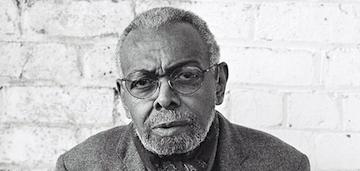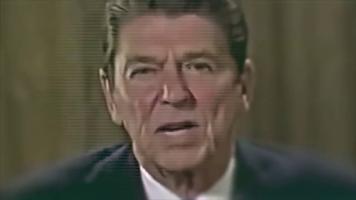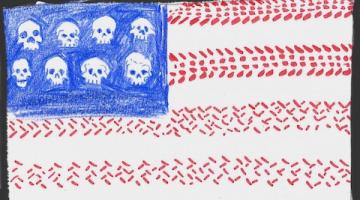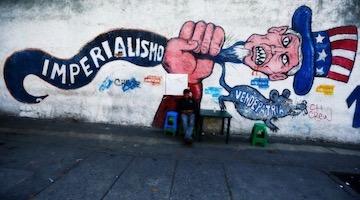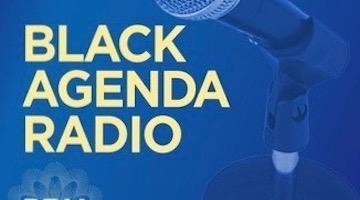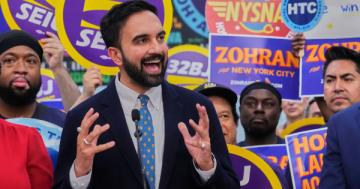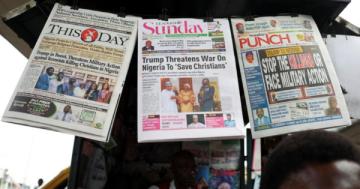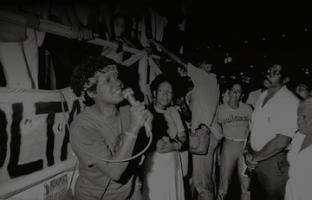Celebrating the Release of American Exceptionalism and American Innocence: A People’s History of Fake News-From the Revolutionary War to the War on Terror
American Exceptionalism is bound to white supremacy and creates a broad national unity around the interests of the ruling class.
“Internationalism is the most effective antidote to the myths of American exceptionalism.”
These are amended remarks given at the launch event for the book American Exceptionalism and American Innocence: A People’s History of Fake News-From the Revolutionary War to the War on Terror, coauthored by BAR contributors Danny Haiphong and Roberto Sirvent. Black Agenda Report Executive Editor Glen Ford contributed the afterword and Black Agenda Report contributing editor Ajamu Baraka contributed the foreword. The launch event was held at The People’s Forum in New York City.
American Exceptionalism and American Innocence: A People’s History of Fake News from the Revolutionary War to the War on Terroris really the culmination of a series of experiences. I was twenty-two when I encountered Black Agenda Report. The U.S., through NATO, was conducting its invasion of Libya. I was completing an internship with CUNY’s Union Semester program. Occupy Wall Street was chanting “We are the 99 percent.” Yet it troubled me that neither the labor movement nor the Occupy Wall Street spent much time talking about war and white supremacy. Black Agenda Report helped me understand why.
“I watched one by one as my Black peers died at an early age.”
With the aid of Black Agenda Report, I began to see myself as a member of a class; the oppressed and working-class masses within the beating heart of the U.S. empire. Black Agenda Report became my political home. The politics of the Black Left placed the conditions around me in their proper context. Being Vietnamese had always meant frequent encounters with the Orientalist style of racism perfected in the Korean and Vietnam war period. I grew up in a working-class household where Clinton era deregulation of the banks, anti-Black racism, and endless austerity possessed real consequences for my family and community. I watched one by one as my Black peers died at an early age. I watched my father work long hours to maintain living standards that were no longer in reach. I went to college and watched the wealthy live lavishly while my darker skinned peers and I struggled to survive. I had awoken to Malcolm X’s American nightmare.
Glen Ford, Ajamu Baraka, Margaret Kimberly, Bruce Dixon, and the entire Black Agenda Report team pointed a way forward out of these miserable conditions. They called for Black liberation, socialism, and internationalism. Black Agenda Report wasn’t afraid to share the spirit of George Jackson and the Black liberation movement with their readers. Black Agenda Report was the only publication to criticize the Obama Administration without apology in a period where the entire progressive and left movement in the U.S. went silent. After struggling to organize in an elitist, white liberal arts school around issues such as the police killings of Black Americans and the ongoing Israeli colonization of Palestine, I began to write for BAR weekly to contribute to what I believed was the most important tool in the hands of the oppressed: political education.Contributing to BAR helped me synthesize what I was experiencing in the labor, socialist, and anti-war movements.
“Black Agenda Report was the only publication to criticize the Obama Administration without apology.”
My co-author Roberto Sirvent emailed me in 2017 asking to collaborate on the book. We drafted the chapters from conversations over email, phone, and text message. It became clear that, if done correctly, this project would serve as a critical contribution to the struggle for social transformation. I was particularly excited to create a book that was both intellectually rich and rooted in the struggle of the working class. I believe we succeeded in this goal. There are three major points that guided our analysis throughout the book:
First, the ideologies of American exceptionalism and American Innocence are critical in the narration of U.S. imperial domination and exploitation.
The ideology of American exceptionalism comes in many forms. It presumes the U.S. is a force for good in the world. A superior civilization. The most advanced and democratic social order ever created. A chosen nation. A City on a Hill. This ideology is bound to white supremacy and creates a broad national unity around the interests of the ruling class such as war, austerity, and police-state surveillance to name just a few.
American innocence defends American exceptionalism. American innocence presumes slavery as a mere blemish in a benevolent U.S. design. The millions killed by the U.S. in Iraq are “worth it” in the words of Madeline Albright. If you’re poor, it is just that you were unable to achieve the American Dream. No matter how many Black Americans are killed by cops or imprisoned, at least Abraham Lincoln freed them from slavery!
“American innocence presumes slavery as a mere blemish in a benevolent U.S. design.”
American exceptionalism and American Innocence help us answer the following questions: Is U.S. economic and military aid around the world assistance or theft? Who gets to “forget” the Korean War? Who and what exactly does the U.S. military serve? Should imperialism matter to Black Lives Matter?
The bookpromotes a spirit of revolutionary optimism that Roberto and I developed as we observed and participated in the political struggles of the last five to ten years. Movements such as Occupy, Black Lives Matter, and even the Sanders campaign reflect a growing discontent among the working and oppressed classes in the U.S. We show how American exceptionalism and innocence have a profound influence not only on the oppressive social conditions of our period but also on the struggles that we wage against them. This book thus contributes to the ideological struggle; the battle of ideas. We argue that ideology shapes history alongside the material forces of society. We must deal with both for our movements for social transformation to be truly effective.
“Ideology shapes history alongside the material forces of society.”
Second, the book seeks to revive the anti-war movement. Internationalism is the most effective antidote to the myths of American exceptionalism. The book condemns the trillion-dollar U.S. war machine and urges readers to develop solidarity with the people of Syria, Venezuela, Ukraine, Russia, China, Zimbabwe, Yemen, Iran, and all nations under the gun of the U.S. military.
American exceptionalism and innocence have been deployed most violently against the peoples of the world. We highlight this violence extensively in the book as well as the struggles and triumphs of oppressed nations against such violence. We challenge all readers, but especially those in the struggle for social justice of any kind, to reflect on the role of American exceptionalism and innocence in creating conditions where the issue of war and peace is erased from political discourse in the U.S. How is it that so many progressives in the U.S. support war both implicitly and explicitly?We believe that American exceptionalism and innocence play a large role in the consensus shared by the ruling class and many on the so-called left on the question of war.
“How is it that so many progressives in the U.S. support war both implicitly and explicitly?”
Lastly, one of the most important aspects of the book is its critique of liberalism especially in its current neoliberal iteration.
American exceptionalism and innocence form the core of liberalism and paint the United States as the hegemonic arbiter of freedom. The U.S. is assumed to be on a never-ending path toward democracy that only it and it alone can claim. The benevolent “Founding Fathers,” we are told, wanted us to build a more perfect union in the form of a republic ruled by the white slave-owning classes. We argue that no critique of U.S. empire, white supremacy, and capitalism is complete without condemning their liberal overseers. Today, liberalism is defined by neoliberal free-market zealotry and warmongering humanitarianism, both of which seek to preserve an imperialist system in crisis.
This crisis is a theme throughout the book. The crisis of U.S. imperialism is a crisis of its capitalist infrastructure. American exceptionalism is indeed wrapped up in this crisis. This was clear during the 2016 elections when Hillary Clinton and Donald Trump debated how best to preserve American exceptionalism. Trump argued that America needed to be made great again. Clinton argued that America was already great. Both arguments revolved around the assumption that the U.S. was great to begin with. We argue that for Black Americans, indigenous peoples, and much of the working class worldwide, this has never been true.
“No critique of U.S. empire, white supremacy, and capitalism is complete without condemning their liberal overseers.”
One of the most insidious forms of American exceptionalism in the neoliberal era is the emergence of the politics of inclusion and diversity. In the chapters “Saving American Exceptionalism: Barack Obama, Hillary Clinton and the Politics of Inclusion,” and “The Violence of Inclusion,” we argue that diversity and inclusion were a response to the revolutionary movements of the 1960s and 1970s. These neoliberal narratives tell us that the U.S. has come a long way by drawing a straight line from the struggles of Black Americans for self-determination to the rise of Barack Obama. The same goes for the struggle for women’s rights and the rise of Hillary Clinton. Barack Obama, Hillary Clinton, and the so-called “inclusive” members of the ruling class operate as valuable weapons of counterinsurgency warfare against radical and revolutionary social transformation. Their unquestionable loyalty to Wall Street and the war machine make this explicitly clear. Inclusion and diversity intentionally ignore this reality entirely in service of the rich.
The Democratic Party is the engine behind the politics of inclusion and the exceptionalist ethos that rule it. Obama’s presidency exposed diversity and inclusion as the last gasp of American exceptionalism. The politics of inclusion attacked critics of U.S imperialism by giving its rulers new clothes. Trump has interrupted this process by stripping the empire naked. The liberal wing of the ruling class is concerned that the image of the U.S. as an exceptional nation is all but lost and that they have nothing to offer the people to revive it. The Democratic Party has latched onto narratives of inclusion and diversity to distract from its complicity in the incarceration of millions of Black Americans or the predicament of nearly half of the U.S. population which cannot afford an emergency of $500. Inclusion, says liberals, reflects the exceptional values of the nation. But it offers no solutions to the crimes being committed by the nation against the masses of people at home and abroad.
“Obama’s presidency exposed diversity and inclusion as the last gasp of American exceptionalism.”
All of this is to say that there are immense challenges and opportunities confronting humanity. This book analyzes the ideologies of American exceptionalism and American innocence to help us understand the chaos and opportunity presented in this moment of history. An unprecedented level of consensus exists between the Democratic and Republican Party in the areas of war, austerity, state repression. We are seeing this consensus being played out in Venezuela and in the ruling class’ opposition to social programs such as Medicare for All. All the while we are being told that the U.S. is a force for good in the world that must stop the Russian bots, Black Identity Extremists, and Chavistas that lurk in our internet screens and on our streets.
Finally, we don’t only review the relationship between American exceptionalism and the crisis conditions of U.S. imperialism. We root our analysis in the historic struggle of oppressed people to overturn and transform these conditions. We discuss the legacies of individuals such as Claudia Jones and Paul Robeson, and that of revolutionary organizations such as the Black Panther Party. We make clear from the outset that the white supremacist and capitalist narratives of American exceptionalism and innocence have always been countered by the narratives and movements of the oppressed. Organizations such as Black Alliance for Peace carry on this struggle in the here and now. If American exceptionalism tells the story of the U.S’ journey of becoming prosperous from enslavement, democratic from genocide, and leader of a world free of stability, then the struggles of oppressed peoples tell the story of the exact opposite kind of journey. American Exceptionalism and American Innocence condemns the former while elevating the latter.
Danny Haiphong is an activist and journalist in the New York City area. He and Roberto Sirvent are co-authors of the book entitled American Exceptionalism and American Innocence: A People’s History of Fake News- From the Revolutionary War to the War on Terror (Skyhorse Publishing). He can be reached at wakeupriseup1990@gmail.com.
COMMENTS?
Please join the conversation on Black Agenda Report's Facebook page at http://facebook.com/blackagendareport
Or, you can comment by emailing us at comments@blackagendareport.com

